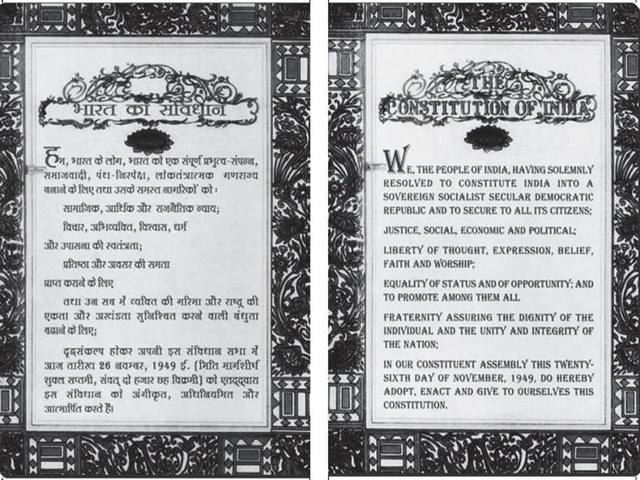Constitution Day 2021: November 26 is being observed as Constitution Day to commemorate the adoption of the Constitution of India. The Constitution Day is also known as Samvidhan Divas or National Law Day. The Constitution of India is the longest written constitution of any country that holds the supreme law of India and lays down the structure, framework, fundamental rights, duties of citizens, powers and duties of government institutions. The significance of celebrating Constitution Day is to pay tribute to the Father of Indian Constitution B R Ambedkar and reaffirm our commitment to uphold and adhere to the ideology of the Indian Constitution.
The Constitution of India is a key topic for the students preparing for competitive exams such as UPSC, Civil Services, SSC, NDA, Railways, State Level Public Services, Banking, SBI, etc.
Q1. Who declared November 26th as Constitution Day?
a) PM Narendra Modi
b) President Ram Nath Kovind
c) Dr B R Ambedkar
d) KM Munshi
Q2. Articles 82 and 170 (3) of Indian constitution are related to which of the following?
a) Readjustment of territorial constituencies
b) Prime Minister and Chief Minister
c) President and Governor
d) None of the above
Q3. Which of the following Part of the Indian Constitution is not correct?
a) Part XII – Relations between the Union and the States
b) Part IX – Three-tier Panchayat System
c) Part XVIII – Emergency provisions
d) Part XX – Amending the constitution
Q4. Article 361 in the Constitution of India is related to ____________?
a) High Courts for States
b) Freedom of Religion
c) Protection of President and Governors and Rajpramukhs
d) Comptroller and Auditor-General of India
Q5. The territorial extent of Indian states and union Territories is prescribed in which schedule of Indian Constitution?
a) 1st Schedule
b) 10th Schedule
c) 6th Schedule
d) 8th Schedule
Q6. Which among the following has the power to legislate on the matters that are neither in the Union List nor in the State list nor in the Concurrent list of the Constitution of India?
a) Parliament
b) State Legislatures
c) Both State legislatures and Parliament
d) Neither Parliament nor State legislature
Q7. The idea of Amendments of the Constitution was borrowed from which country?
a) US
b) Japan
c) South Africa
d) Germany
Q8. Which Schedule of Indian Constitution contains provisions of President and Governors?
a) 10th Schedule
b) 1st Schedule
c) 12th Schedule
d) 2nd Schedule
Q9. Which of the following is TRUE with regard to the Constitution of India?
Statement 1: The Indian Constitution was adopted on November 26, 1949. It was implementated formally started on January 26, 1950.
Statement 2: B R Ambedkar is known as the Father of the Indian Constitution. He was the Chairman of the Drafting Committee of the Constitution of India.
a) Statement 1
b) Statement 2
c) Both 1 and 2
d) Neither
Q10. Which of the following word is not included in the Preamble of the Constitution of India?
a) Justice
b) Equality
c) Liberty
d) Freedom
Answers
1. (a) PM Narendra Modi
PM Narendra Modi on October 11, 2015 declared November 26 as Constitution Day while laying down the foundation stone of the B R Ambedkar’s Statue of Equality Memorial in Mumbai.
2. (a) Readjustment of territorial constituencies
Articles 82 and 170 (3) of the Constitution provide that no fresh readjustment of constituencies can be undertaken until the figures of the first census taken after the year 2000 are published.
3. (a) Part XII – Relations between the Union and the States
The Part XI of the Indian Constitution: Relations relates to Relations between the Union and the States.
4. (c) Protection of President and Governors and Rajpramukhs
Article 361 of the Constitution of India 1949 states that the President, or the Governor or Rajpramukhs of a State, shall not be answerable to any court, no criminal proceedings against them or no process of arrest or imprisonment shall be issued by any court during their term of office.
5. (a) 1st Schedule
The 1st Schedule of the Indian Constitution lists the States and Union Territories of India as well as lists of any changes to their borders. It also includes the laws used to make that change.
6. (a) Parliament
The subjects which are not enlisted in Union/ State/ Concurrent List are called Residuary subjects. The power to legislate on residuary subjects lies with the Parliament.
7. (c) South Africa
The Constitution of India has borrowed two features from the Constitution of South Africa namely ‘Amendments of the Constitution and Election of members of the Rajya Sabha
8. (d) 2nd Schedule
The 2nd Schedule of the Indian Constitution contains provisions of the President, Governors of States, Speaker and the Deputy Speaker of the House of the People, the Chairman and the Deputy Chairman of the Council of States, the Speaker and the Deputy Speaker of the Legislative Assembly, the Chairman and the Deputy Chairman of the Legislative Council of a State, the Judges of the Supreme Court and of the High Courts, and the Comptroller and Auditor-General of India.
9. (c) Both 1 and 2
Both Statement 1 and Statement 2 are correct.
10. (d) Freedom
The word Freedom is not included in the Preamble of the Constitution of India. The words Justice, Equality, Liberty, and Fraternity are included in the Preamble.
 Text of the Preamble of the Indian Constitution, Image: PIB
Text of the Preamble of the Indian Constitution, Image: PIB
Comments
All Comments (0)
Join the conversation